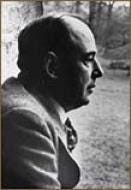Poetry Friday - That long way round
Today I have another C.S. Lewis. This is one of his finest poems, if you were to ask me. And if you have read The Problem of Pain or A Grief Observed you will hear its echoes here. This poem is longer, and might take more effort to understand, but is so well worth it. (Surprisingly I couldn't find it anywhere at all on the internet either and so had to type it out — I did something very bibliophilic and obtained a first edition of Lewis's Poems, because it only cost me $14 for the hardcover in great condition!).

Five Sonnets
1
You think that we who do not shout and shake
Our fists at God when youth or bravery die
Have colder blood or hearts less apt to ache
Than yours who rail. I know you do. Yet why?
You have what sorrow always longs to find,
Someone to blame, some enemy in chief;
Anger’s the anaesthetic of the mind,
It does men good, it fumes away their grief.
We feel the stroke like you; so far our fate
Is equal. After that, for us begin
Half-hopeless labours, learning not to hate,
And then to want, and then (perhaps) to win
A high, unearthly comfort, angel’s food,
That seems at first mockery to flesh and blood.
2
There’s a repose, a safety (even a taste
Of something like revenge?) in fixed despair
Which we’re forbidden. We have to rise with haste
And start to climb what seems a crazy stair.
Our consolation (for we are consoled,
So much of us, I mean, as may be left
After the dreadful process has unrolled)
For one bereavement makes us more bereft.
It asks for all we have, to the last shred;
Read Dante, who had known its best and worst—
He was bereaved and he was comforted
—No one denies it, comforted—but first
Down to the frozen centre, up the vast
Mountain of pain, from world to world, he passed.
3
Of this we’re certain; no one who dared knock
At heaven’s door for earthly comfort found
Even a door—only smooth, endless rock,
And save the echo of his cry no sound.
It’s dangerous to listen; you’ll begin
To fancy that those echoes (hope can play
Pitiful tricks) are answers from within;
Far better to turn, grimly sane, away.
Heaven cannot thus, Earth cannot ever, give
The thing we want. We ask what isn’t there
And by our asking water and make live
That very part of love which must despair
And die and go down cold into the earth
Before there’s talk of springtime and re-birth.
4
Pitch your demands heaven-high and they’ll be met.
Ask for the Morning Star and take (thrown in)
Your earthly love. Why, yes; but how to set
One’s foot on the first rung, how to begin?
The silence of one voice upon our ears
Beats like the waves; the coloured morning seems
A lying brag; the face we loved appears
Fainter each night, or ghastlier, in our dreams.
‘That long way round which Dante trod was meant
For mighty saints and mystics not for me,’
So Nature cries. Yet if we once assent
To Nature’s voice, we shall be like the bee
That booms against the window-pane for hours
Thinking that way to reach the laden flowers.
5
‘If we could speak to her,’ my doctor said,
‘And told her, “Not that way! All, all in vain
You weary out your wings and bruise your head,”
Might she not answer, buzzing at the pane,
“Let queens and mystics and religious bees
Talk of such inconceivables as glass;
The blunt lay worker flies at what she sees,
Look there—ahead, ahead—the flowers, the grass!”
We catch her in a handkerchief (who knows
What rage she feels, what terror, what despair?)
And shake her out—and gaily out she goes
Where quivering flowers stand thick in summer air,
To drink their hearts. But left to her own will
She would have died upon the window-sill.’
C.S. Lewis

